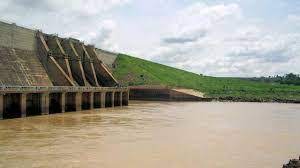Minister of Humanitarian Affairs and Poverty Alleviation, Dr Betta Edu, has advised states and local governments to adopt safety measures to avoid impending flood that is expected as a result of the recent opening of Lagdo Dam in Cameroon.
There were media reports that authorities in Cameroon had alerted the Nigerian government that they would open the Lagdo Dam to release water, a development that would put some Nigerian states at risk of flood.
But speaking Monday night in Abuja during a coordinating meeting by the Ministries of Humanitarian Affairs, Water Resources, Environment and Health among others, Edu said it is inconceivable for the federal government to stand and watch the loss of lives and property of Nigerians, hence the timely warning.
She said: “This coordinating meeting is holding at the instance of President Bola Ahmed Tinubu, who directed such after I raised the issue of flooding in today’s Federal Executive Council meeting. Mr President directed that all relevant ministries must meet to find a solution to the issue of flooding.
“As earlier stated, the Lagdo Dam in Cameroon was opened recently and we will see the effect in the coming days. Flood has been a major issue in Nigeria and has been causing loss of lives and property. We have been given a task by Mr President to ensure proper preparedness against the effect of the opening of the Lagdo Dam.
“One of the things government in different states must begin to do is to ensure that drainages are cleaned. Blockages must be removed. Also, proper enlightenment and sensitization of residents must be carried out. Residents in affected areas must begin to relocate to safer planes. States must stand up to involuntary relocations. It is inconceivable to witness avoidable loss of lives and property.
“Other short-term measures must be adopted by states to safeguard loss of lives and property. We will be working with other ministries, states, relevant agencies and stakeholders to ensure the provision of items to affected states.”
Environment, Water Resources
On his part, Minister of Environment and Ecological Management Ishak Salako said that the ministry was giving hourly warnings on rising water level and that states must prepare to mitigate flood.
He said: “The flood early warning system is domiciled with the Ministry of Environment and it is ongoing. Apart from the opening of the Lagdo Dam in Cameroon, we are issuing hourly alert on River Benue, River Niger and others. We are alerting Nigerians on the water level. We hope that will help us to alert our people to take precautionary measures to relocate to safer places.
“With what we saw today, the government of President Bola Ahmed Tinubu is strong on collaboration and we hope to see more of that. We hope that in the coming years, we won’t be having flood incidents and that flood incidents will be minimized. It requires the collaboration of states, local governments and stakeholders for us to mitigate flood.”
Similarly, Minister of Water Resources and Sanitation Professor Joseph Utsev said the media is a relevant stakeholder in disaster management and must continue to alert Nigerians on flood and other critical issues.
“What we are talking about here, apart from the opening of the Lagdo Dam, which is a natural occurrence, is that the media is critical in the campaign against flooding. As a government, we are trying to find an everlasting solution to flooding, the sufferings of Nigerians and the loss of lives and property.
“We are trying to look at the short term measures. The level of flood is presently under control, but as rain continues to fall, flood may certainly set in. So, what are the measures put in place? So, we are calling on Nigerians at state and local government levels to clean their drainages and keep the environment clean to curb flooding,” Utsev said.
NHSA
And following this, the Yola Operations Office Coordinator of the Nigeria Hydrological Services Agency (NIHSA) Ladan Ayuba, Monday gave out a list of states likely to be affected as Benue, Nasarawa, Kogi, Edo, Enugu, Anambra, Delta, Rivers and Bayelsa.
He stated that there would be a gradual release in days ahead due to heavy rainfall in Cameroon, adding that the water had yet to be released.
“When the water will be released depends on the agreement between the Nigerian government and Cameroon. They have to agree on the modalities so that it will not cause havoc,” Ayuba said this Monday.




